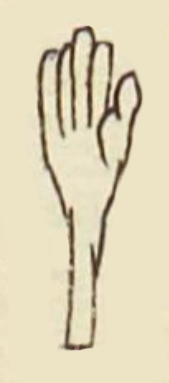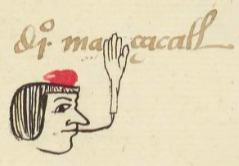Mazacatl (MH895v)
This black-line drawing of the simplex glyph for the personal name Mazacatl (literally, Hand-Grass, but perhaps intending “Bewitcher”) is attested here as a man’s name. The glyph shows a frontal view of the palm-side of a right hand (maitl). A line indicating the thenar (pad near the thumb) gives the hand a slight three-dimensionality. The hand has a long thin arm below it, perhaps intending to convey a hint about long blades of grass or straw (zacatl). The hand is a phonetic indicator that the name starts with Ma-, especially if the translation “Bewitcher” is the one intended.
Stephanie Wood
Fernando Horcasitas (The Aztecs Then and Now, 1979, 117) translates Mazacatl as a “Bewitcher” who can cast spells on people and abandon them in the forest or in the empty streets at night, possibly driving them crazy or even to their deaths. Even if the Nahuas had people they thought of as sorcerers, some of these stories appear to have been influenced by Spanish narratives. [On this latter point, see the Journal de la Société des américanistes, v. 92, p. 122.]
Stephanie Wood
dio maçacatl
Diego Mazacatl
Stephanie Wood
1560
Jeff Haskett-Wood
hechiceras, brujas, manos, zacate, paja, nombres de hombres

ma(itl), hand or arm, https://nahuatl.wired-humanities.org/content/maitl
zaca(tl), hay, grass, straw, https://nahuatl.wired-humanities.org/content/zacatl
Hechicera
Stephanie Wood
Matrícula de Huexotzinco, folio 895v, World Digital Library, https://www.loc.gov/resource/gdcwdl.wdl_15282/?sp=863&st=image.
This manuscript is hosted by the Library of Congress and the World Digital Library; used here with the Creative Commons, “Attribution-NonCommercial-ShareAlike 3.0 License” (CC-BY-NC-SAq 3.0).



